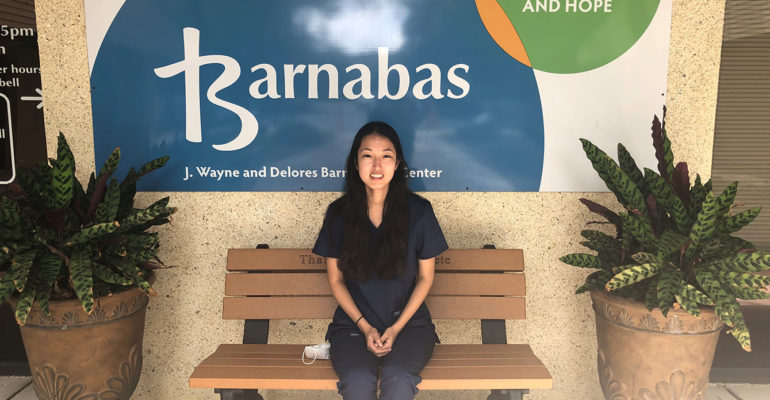By Jin Choi, Barnabas AmeriCorps member
Of all the questions I was asked during my medical school interviews, this one stuck with me the most: What matters more in caring for a patient – knowledge or empathy? Before beginning my service with the National Health Corps I would have, without hesitation, answered “knowledge”. However, my experience as an AmeriCorps member serving at Barnabas Health Services has shown me the significance of empathy in patient interactions.

Barnabas Health Services in Fernandina Beach provides primary care to uninsured and low income residents across Nassau County. My main role as a care coordinator is to discharge patients after they meet with providers. I educate patients on their treatment plans and give them directions to follow up with referrals to specialty care and diagnostic testing. In addition, I connect patients with several other resources that my host site offers, such as tobacco cessation classes, dental care, and the food pantry. Since I began my service in August, the past two months have been filled with training at my host site. I continuously received training on vital signs, normal levels of blood glucose, diets that can lower triglycerides in the body, and other knowledge that form the basic foundation required for me to fulfill my role.
However, all this knowledge makes little impact if I cannot motivate the patients to follow their treatment plans and adopt healthier lifestyles. Through National Health Corps training days, I learned a skill called Motivational Interviewing which helps clients find the internal incentive they need to change their behaviors. Empathy is an essential part of motivational interviewing in the form of verbal validation of the challenges the patients are facing. The patients that come to Barnabas Health Services put their faith in us to understand them in addition to their needs. Affirming their pain and struggles helps build client relationships based on trust and compassionate communication. These positive interactions play a key role in patients feeling more open to conversations about embracing healthier behaviors and result in better outcomes. National Health Corps’ training in motivational interviewing and expressing empathy is helping translate my knowledge into impact.
The first two months of my service have allowed me to recognize the interconnected roles of knowledge and empathy in caring for a patient. These training I’ve received has not only prepared me for my future career in medicine, but have also allowed me to bring genuine care to each and every patient interaction. As I embark on the rest of my service journey with the National Health Corps, I will continue to actively listen and validate each patient’s stories and struggles, allowing me to provide the individualized and compassionate care every patient both needs and deserves.

